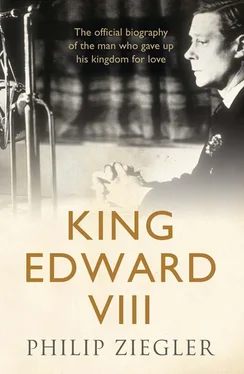It has been said that the sympathy for Germany which the Prince of Wales showed in the 1930s stemmed from the success of his pre-war visits. All the evidence is that, though he enjoyed his stay there and liked some of his relations, he was not particularly struck by the country or its people. ‘The Germans as a race,’ he told a friend, ‘are fat, stolid, unsympathetic, intensely military, and all the men have huge cigars sticking out of their faces at all times.’ 159‘The trip was very interesting,’ he reflected when he got back to London, ‘but I don’t care much about the Germans.’ 160Of the countries which he visited before the First World War, the one that pleased him most was Norway, where he loved the skiing, the open-air existence and the informality of court life – ‘a lovely country with a charming people,’ he found it. ‘It was just like home.’ 161This last comment betrayed his real priorities. Far though he might wander, and much pleasure though he might derive from his wanderings, whether as Prince, as King, or as Duke of Windsor, there was always for him to be no place like home.
By the summer of 1914 the King had agreed that his son should spend the last few months of the year travelling and should join the Grenadier Guards the following year. The prospect was pleasing enough, but already shades of the prison house were beginning to close upon the growing Prince. The first dread intimation of what was to come had struck him in June 1912, when he got back at lunch time from his stay in France to find that the same afternoon he had to go with the King and Queen to a St John’s Ambulance Parade – ‘rather, if not very dull’; at 6.30 p.m. he was receiving the Khedive of Egypt and at 8.30 he was taking the wife of the Bishop of Winchester in to dinner. 162From then on public functions multiplied. He quickly decided that the more formal and decorous they were, the more he would dislike them. He attended his first court in March 1914 and found it ‘mighty poor fun … I went in with the parents to the ballroom and stood till 11.00 while hundreds of women went by, each one plainer than the last … I don’t mind if I never go to one again.’ He did go, of course, and resented it even more: ‘a bum show. This court etiquette is intolerable.’ As for the state visit of the King and Queen of Denmark: ‘What rot and a waste of time, money and energy all these state visits are.’ 163
When he had a proper job to do, however, he did it conscientiously and well. He was sent by the King to greet Poincaré, now President of the Republic, on his arrival at Portsmouth. The French statesman was impressed by his ‘charm of manner and vivacity’. The Prince had ‘lost none of his former delightful simplicity’ but had ‘“come on” a good deal’. 164The King was delighted by the reports he was given of his son’s performance: ‘It gave both Mama and me great pleasure … I may sometimes find fault with you but I assure you it is only for your own good and because I am so devoted to you.’ 165The Prince’s first important solo performance came in June 1914 when he opened the new church of St Anselm on the Duchy of Cornwall estates in south London. He took endless trouble with his speech and carried it off well: ‘I had a wonderful sense of confidence in the audience, who I felt would make allowances for it being my 1st public function.’ 166At present, he told his audience, he knew little of the difficulties which beset those who were concerned with housing for the working classes, ‘but by studying the comfort and happiness of my tenants I hope to gain experience’. Congratulations flowed in, on his diction, his pace, his obvious sincerity; the one that would have pleased him most because it was not intended for his eyes was sent to one of the ladies-in-waiting, Lady Fortescue. ‘It was a wonderful success. He did it quite beautifully. At first he seemed a little nervous but it wore off and his speech was quite charming. He said it as if he really meant it … and in such a firm, charming voice. Everyone was tremendously enthusiastic … He looked so young among all those elderly prelates, but so dignified.’ 167
For the first time he began to talk seriously to politicians and form opinions of them. Churchill was his hero, mainly because he was now First Lord of the Admiralty and arch advocate of a larger Navy: ‘He is a wonderful man and has a great power of work.’ Asquith, the Prime Minister, he liked, though he found Mrs Asquith ‘rather tiring and never stops talking’; Esher and Lulu Harcourt (the Colonial Secretary) were particularly tiresome. 168If he had any preference between the parties he did not confide it to his diary, though on certain issues he feared the Liberal government would be insufficiently firm. He had strong views about the suffragettes and told his father that he hoped ‘the woman suffrage bill will never be passed. It is curious how divided the present cabinet is on the subject.’ 169To his relief Asquith held firm. ‘I really think that at last some drastic measures are to be taken as regards those bl-d- suffragettes, whose conduct is becoming more and more infamous every day,’ he told Godfrey Thomas in the summer of 1914. 170He was as strongly opposed to Home Rule for Ireland. ‘I hope it will not pass,’ he wrote in his diary when the Home Rule Bill was introduced in 1912. 171His parents shared his views on the future of Ulster. Queen Mary wrote him outspoken letters in March and April 1914 about the weakness of the government and the deplorable way they had treated the Army. 172‘Although we aren’t supposed to have any politics,’ the Prince responded, ‘there does come a time when all that outward nonsense must be put aside, and that time has come.’ 173
Socially his life was transformed in that last summer before the war. His parents had had a party for him at Buckingham Palace in March 1913. ‘I had to dance, a thing I hate,’ he wrote forlornly in his diary: ‘The whole thing was a great strain.’ He did not change his views for a year at least; then in July 1914 as a twenty-year-old he went to the Londesboroughs’ ball. ‘I stuck out to the bitter end and got back at 2 a.m. It was really great fun,’ he recorded in mild astonishment. Next night it was the turn of the Portlands: ‘The floor was perfect and my dancing is improving.’ He stayed till 3.45, and did the same the following night at the Salisburys’. 174A looker-on at the Salisburys’ dance who did not know about his change of heart commiserated on his sad plight: ‘The Prince is no dancer … It was something of an ordeal for so young a boy and of so retiring a disposition.’ 175The sympathy was uncalled for: ‘I have now become fond of dancing and love going out!’ 176But he was still discriminating. Baroness Orczy saw him at a court ball in mid-July, dancing the quadrille d’honneur with one of his aunts and looking ‘moody and somewhat bored’. 177Nor did he allow his new-found enthusiasm in any other way to change his train of life. He was up at 6 a.m. after the Londesborough ball, rose at 7 a.m. for a swim after the Portlands’ and was playing squash by 7 a.m. after the Salisburys’: ‘I’ve had only 8 hours sleep in the last 72 hours.’ 178
The ferocious social round was combined with a course with the Life Guards – riding school, sword drill, care of horses and equipment, marching. ‘Not very exciting but anyhow a definite job which is the gt thing!!’ he wrote in his diary. ‘Military life and ways are curious.’ 179He still pined for the Navy. Halfway through his cavalry course he went with the King to Portsmouth for the naval review and visited old friends aboard HMS Collingwood . It was ‘glorious. God what a life this is compared to my attachment.’ 180But he knew that it was a paradise not to be regained. The plan was that he should spend 1915 with the Grenadier Guards, 1916 with the Royal Horse Artillery, and then join the 10th Hussars on their return from South Africa. Meanwhile he danced the summer away and made plans for another grand tour of Europe in the autumn. A break in the routine came at the end of June when he spent a week with the Officers’ Training Corps and manoeuvred vigorously about the plains near Aldershot. ‘When in camp I make it a rule never to open a newspaper,’ he wrote to a friend, ‘so am completely ignorant of all happenings in the outer World, except that the Austrian Archduke and his wife have been assassinated. I expect it has caused a stir in Germany.’ 181
Читать дальше












